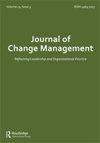An Overview of Reviews: Organizational Change Management Architecture
IF 3
Q2 MANAGEMENT
引用次数: 0
Abstract
ABSTRACT The current review overview attempts to create order in the overall fragmented scenario regarding output on organizational change management. Grounded on 39 selected reviews out of 113 identified, the manuscript creates a theoretical summary of knowledge and allows change determinants to emerge. Whereas the existing literature refers to a theory or an implementation model and then introduces the analysis of several patchy variables, the proposed organizational change taxonomy refines well-established models by introducing the study of nine thematic groups containing a total of 41 variables. The strategic and behavioral change variables are classified according to the role (antecedent, moderator, mediator, outcome), the direction (positive, negative) and level (micro, meso, macro) of the change phenomenon. This summary clarifying change characteristics and intrinsic complexity suggests directions for future empirical studies and practical tools for managers to design organizational change management architecture with implementation success. MAD statement Since research on change management proceeds at a dizzying pace, it is useful to periodically take stock of the situation on the state of the art. This review provides an updated overview on the current organizational change management scenario. While the manuscript presents a renewed framework, it also suggests a research agenda with new possible ways to further study the field.评审概述:组织变更管理架构
当前的综述试图在关于组织变革管理输出的整体碎片场景中创建秩序。根据113篇选定的39篇评论,该手稿创建了知识的理论总结,并允许变化决定因素出现。现有的文献是指一个理论或一个实施模型,然后引入几个零散变量的分析,而本文提出的组织变革分类法通过引入包含41个变量的9个主题组的研究来完善已建立的模型。战略和行为变化变量根据变化现象的角色(前事、调节、中介、结果)、方向(积极、消极)和水平(微观、中观、宏观)进行分类。这一总结澄清了变革的特征和内在复杂性,为未来的实证研究提供了方向,并为管理者设计成功实施的组织变革管理架构提供了实用工具。由于对变更管理的研究以令人眼花缭乱的速度进行,因此定期对技术状况进行评估是有用的。这个回顾提供了对当前组织变更管理场景的更新概述。虽然手稿提出了一个新的框架,但它也提出了一个研究议程,其中包含了进一步研究该领域的新可能方法。
本文章由计算机程序翻译,如有差异,请以英文原文为准。
求助全文
约1分钟内获得全文
求助全文
来源期刊

JOURNAL OF CHANGE MANAGEMENT
MANAGEMENT-
CiteScore
6.60
自引率
20.00%
发文量
14
期刊介绍:
Journal of Change Management is a multidisciplinary and international forum for critical, mainstream and alternative contributions - focusing as much on psychology, ethics, culture and behaviour as on structure and process. JCM is a platform for open and challenging dialogue and a thorough critique of established as well as alternative practices. JCM is aiming to provide all authors with a first decision within six weeks of submission.
 求助内容:
求助内容: 应助结果提醒方式:
应助结果提醒方式:


